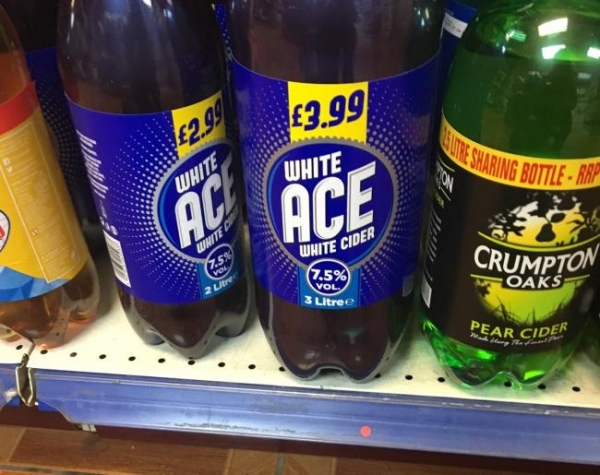Report reveals alcohol sold at pocket money prices
A new report released today (Thursday 6 October), reveals an abundance of high strength alcohol being sold for pocket money prices in shops and supermarkets in the North East.
Cheap alcohol: the price we pay, surveyed the price of almost 500 alcohol products at supermarkets, shops and off licences across four areas of the UK – the North East, North West, Scotland and London.
Five years since the last price report was conducted by Balance, the North East Alcohol Office, and UK-wide partners, the new findings show alcohol products can be bought in the North East for as little as 18p per unit.
The ranks of the cheapest products are dominated by strong white ciders predominantly consumed by children and heavy drinkers. A three litre bottle of super-strength white cider, which contains the equivalent of a shocking 22 shots of vodka, was found in the region for under £4.
At this cost, the Chief Medical Officers’ recommend weekly drinking limit of 14 units for men and women can be bought for around £2.50. It also means the average child’s pocket money of £5.75 could buy more than double an adults’ weekly limits.
The report highlights it was relatively easy to find many alcohol products at 25p per unit, half the 50p per unit the Scottish Government is trying to introduce. Vodka was found to be readily available in the North East for less than 40p per unit.
As cheap alcohol continues to be widely available, alcohol harm costs the North East an estimated £911m every year, with more than 67,000 alcohol-related hospital admissions, including over 300 hospital admissions per year for children with alcohol-specific conditions. It is responsible for 195,360 alcohol-related crimes, causes 60 different medical conditions, and 45% of people in the North East are drinking at risky levels.
The North East findings are part of the report released today by the Alcohol Health Alliance (AHA), of which Balance is a member along with medical royal colleges, alcohol organisations and health bodies around the country. The report argues that recent cuts in alcohol taxes allow supermarkets to sell alcohol at rock bottom prices, but have done little to benefit pubs and their customers.
Colin Shevills, Director of Balance, said: “It’s five years since we teamed up with our partners around the UK to look at the price we’re paying for alcohol. In this time, despite the Government’s commitment to deal with the serious problems alcohol causes, very little has been done to change the price we pay for the cheapest alcohol.
“This years’ report found some of the worst culprits to be cheap white ciders and spirits, which are the drinks of choice for some of the most vulnerable members of society, including young people and dependent drinkers.”
The report has led to renewed calls from campaigners for the introduction of a minimum unit price, as well as an increase in cider duty to make alcohol less affordable.
Colin continued: “It’s not right that an anomaly in the tax system means that industrial strength white cider can be sold so cheaply, fuelling some of the worst problems we have with alcohol. This continued failure to tackle alcohol misuse is sorely felt by families and communities around our region.
“We need the Government to increase duty on super strength cider which is much lower than the duty on beer. The introduction of a minimum unit price as a targeted, evidence-based measure, would also help to reduce the harms of cheap alcohol.
“We know that recent cuts to alcohol duty are only benefiting supermarkets and off licences while pubs, which generally provide a safer environment for drinking, continue to close. The evidence shows a minimum unit price would barely affect moderate drinkers and leave pub prices untouched, but it would make our system much fairer and address the serious problems we’re facing.
“We’re urging the Government to take action and begin to turn the tide on alcohol related harm. It’s vital we don’t have another five lost years.”
The report, Cheap Alcohol: the price we pay, warns that, unless action is taken on the availability of cheap alcohol, harms associated with alcohol consumption will continue to rise, increasing the burden on the NHS and public services.
